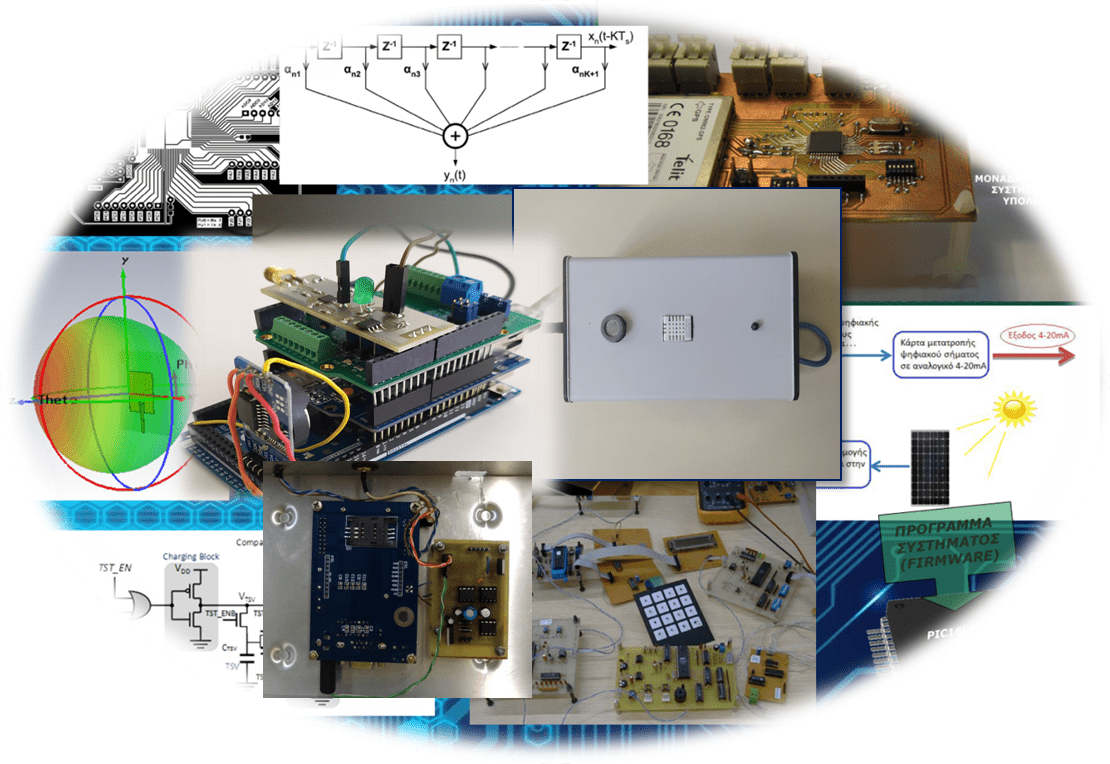Postgraduate Studies in Modern Electronic Technologies
General Description – Purpose – Title obtained
The Master’s Program in Modern Electronic Technologies has been operating in the Physics Department of the University of Ioannina since 1996, while it was recently re-established under Law 4485/17 with some revisions to make it even more attractive to the graduates it addresses. The object of the MSc in Modern Electronic Technologies (MSc-MET) is the post-graduate education and specialization in modern electronic technologies of graduates of related departments, graduates of Greek Universities or ATEIs or holders of recognized equivalent diplomas from abroad.
The purpose of MSc-MET is to train the aforementioned graduates so that they can contribute to the promotion of research and development processes, as well as to the support of production in technological matters in the branches of Modern Electronic Technologies. MSc-MET particularly promotes interdisciplinarity by dealing with electronics in cutting-edge industries (eg Biomedicine, Environment, Telecommunications) that require innovative electronic systems supporting not only research but also production and employment.
MSc-MET awards a Postgraduate Diploma in Modern Electronic Technologies equivalent to the MSc. At MSc-MET, graduates of Physics, Informatics, Electronic Engineering, Electrical Engineering, Computer Technology Engineering, Computer Engineering, Computer and Informatics Electrical Engineering, Computer Telecommunications and Network Engineering and other related specialties, nationally and internationally recognized, are accepted institutions abroad as well as graduates of ATEI departments of a related subject. The duration of the Master’s Degree is three (3) semesters.
Academic profile and orientation of MSc-MET
The Postgraduate Program in Modern Electronic Technologies (MSc-MET), fully aligned with the principles of the Department of Physics and the University of Ioannina, provides free high-level postgraduate studies aiming at the promotion of scientific knowledge and the development of skills and practices, which will be utilized by postgraduate students for their professional and social development.
The establishment of MSc-MET coincides in time with the second decade of the digital revolution and the consolidation of the world wide web, which gave a rapid impetus to the development of the economy through the establishment of new businesses and companies in the field of innovative electronic technologies. The increased job offer in this subject, gave the opportunity to a large percentage of MSc-MET graduates to be directly absorbed in companies (telecommunications, IT, electronics, etc.) mainly in the private sector. MSc-MET covered the demand of Western Greece for studies in electronic technologies due to the absence of similar MSc in the region.
Today, MSc-MET, after 26 years of operation and having trained a large number of postgraduate students with the production of high quality teaching work, participates in global research and development programs in related scientific subjects with very high indicators.
Graduate employment, graduate pathway information, career outlook, link to work/research areas

Electronic technologies are constantly transformed and gradually expanded to a wide range of labor market. The purpose of the MSc-MET is to train graduates so that they can contribute to the promotion of research and development processes, as well as supporting technological production in the fields of modern electronic technologies. Graduates of the MSc-MET are competitive as evidenced by their high absorption in the labor market, national, European and internationally, related to that of modern electronic technologies. The MSc-MET highlights interdisciplinaryism by engaging in cutting-edge sectors such as telecommunications, computer science, biomedical, environment, energy that require innovative electronic systems, helping not only research but also production and employment.
Announcements:
- Accreditation of MSc-MET by HAHE
- Announcement for the Admission of Postgraduate Students to the MSc-MET
- Maximum duration of MDE preparation (applies to postgraduate students with admission year before 2018-2019).
Legal framework:
State Gazette of Establishment: 749/27-8-1996,
State Gazette of Replacement: 43/22-1-2003,
State Gazette of Replacement: 2062/29-7-2014,
State Gazette of Re-establishment: 1729/Β/18-5-2018.
State Gazette of Modification: 1593/Β/15-3-2023.
Steering Committee:
Papadopoulos Ioannis, Associate Professor (Director)
Fountas Konstantinos, Professor
Evangelou Evangelos, Associate Professor
Christofilakis Vasilios, Assistant Professor
Strologas Ioannis, Assistant Professor
External Advisory Board
The External Advisory Board of the Master’s Program in Modern Electronic Technologies (MSc-MET) is composed of scientists who are at the forefront of the job market and research, distinguished in significant positions and subjects covered in the MSc-MET. Additionally, several members of the committee are graduates of the MSc-MET.
The primary role of the Board is to enhance the quality cycle of the MSc by increasing feedback mechanisms. The Director and the Coordinating Committee of the MSc-MET take into account all observations and proposals of the External Advisory Board, proceeding with actions always aimed at further improving the MSc.
Additionally, the committee members, in collaboration with the Coordinating Committee of the MSc-MET, may inform postgraduate and undergraduate students of the Department of Physics about the latest scientific developments in their field as well as career prospects.
The members of the committee are as follows (in alphabetical order):
- Dr. Makis Asimidis (Mitel Networks Co.: Senior Product Manager, MiCollab)
- Dr. Kostas Kloukinas (CERN: Senior Staff, Applied physicist and team leader in the Microelectronics Section in the Experimental Physics Department)
- Dr. Dimitrios-Marios Kolotouros (General Electric Healthcare: Lead Electrical Engineer)
Christos Bassios (Acrossmedia241: Head of Marketing & Business Development) - Dr. Michalis Bachtis (UCLA Physics & Astronomy: Associate Professor)
- Spyros Frangistas (Huawei: Photovoltaic Inverter and ESS Technical Solution Manager)
The Board was approved at the 608/22-4-2024 Faculty Senate meeting of the Department.
Contact:
Address:
MSc in Modern Electronic Technologies
Physics Department
University of Ioannina
45110 Ioannina
Greece
Secretariat:
Mrs. Eugenia Nakou, enakou@uoi.gr, τηλ. 2651007491
Access map:
Regulations:
- Internal regulation of operation
- Regulation of operation of the institution of academic advisor
- Regulations for the operation of the mechanism for managing student complaints and objections
- Regulation of studies, practical training, mobility, preparation of assignments
- Research Ethics Regulation
- MSc Thesis template (docx)
About the MSc in Modern Electronic Technologies:
- Quality policy for the development/improvement of the MSc
- Quality Targeting
- Scientific – research and teaching work of the Teachers
- Evaluation results from postgraduate students
- Graduate Absorption Study
- Graduate research performance
Courses and Lecturers:
The courses, teaching and research work, practical exercises and any other kind of educational and research activities for the awarding of the MSc are tentatively defined as follows:
CODE | REQUIRED COURSES | ECTS | WEEKLY HOURS | LECTURE |
1st SEMESTER | ||||
Μ411 | Physics of Electronic Devices | 5 | 3 | Evangelou E. Baldoumas G. |
Μ412 | Digital Electronics | 8 | 5 | Foudas C. |
Μ413 | Microprocessors-Microcontrollers-Laboratories | 8 | 6 | Evangelou I. |
Foudas C. Bletsas D.E. | ||||
Μ414 | Microelectronics-Design with VHDL-Laboratories | 9 | 6 | Manthos N. |
Papadopoulos I. Strologas I. | ||||
Total ECTS-Weekly Hours (1st SEMESTER) | 30 | 20 | ||
2nd SEMESTER | ||||
Μ421 | Analog Electronics | 5 | 3 | Tsiatouchas G. |
Μ422 | Electronic Design-Laboratories | 9 | 7 | Evangelou E. Papadopoulos I. |
Baldoumas G. Bletsas D.E. | ||||
Μ423 | Telecommunication Principles | 8 | 5 | Christofilakis V. |
Mitrou N. | ||||
Μ424 | Digital Signal Processing | 8 | 5 | Christofilakis V. |
Total ECTS-Weekly Hours (2nd SEMESTER) | 30 | 20 | ||
3rd SEMESTER | ||||
Μ430 | M.Sc. Thesis Dissertation | 30 | ||
Total ECTS-Weekly Hours (3rd SEMESTER) | 30 | |||
Teaching, assignments and exams at MSc-MET are held in Greek and/or English. The MSc Diploma Thesis can be written in either English or Greek.


